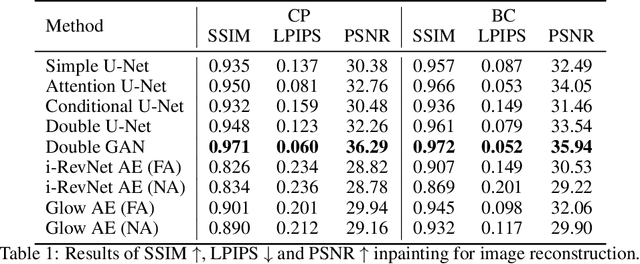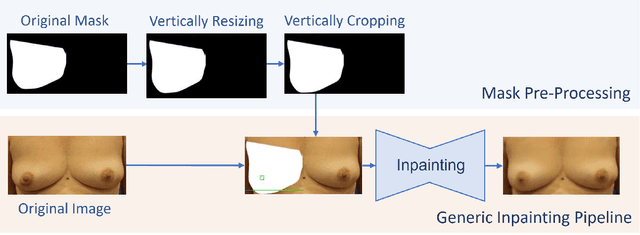Helena Montenegro
An inpainting approach to manipulate asymmetry in pre-operative breast images
Feb 08, 2025



Abstract:One of the most frequent modalities of breast cancer treatment is surgery. Breast surgery can cause visual alterations to the breasts, due to scars and asymmetries. To enable an informed choice of treatment, the patient must be adequately informed of the aesthetic outcomes of each treatment plan. In this work, we propose an inpainting approach to manipulate breast shape and nipple position in breast images, for the purpose of predicting the aesthetic outcomes of breast cancer treatment. We perform experiments with various model architectures for the inpainting task, including invertible networks capable of manipulating breasts in the absence of ground-truth breast contour and nipple annotations. Experiments on two breast datasets show the proposed models' ability to realistically alter a patient's breasts, enabling a faithful reproduction of breast asymmetries of post-operative patients in pre-operative images.
Anonymizing medical case-based explanations through disentanglement
Nov 08, 2023



Abstract:Case-based explanations are an intuitive method to gain insight into the decision-making process of deep learning models in clinical contexts. However, medical images cannot be shared as explanations due to privacy concerns. To address this problem, we propose a novel method for disentangling identity and medical characteristics of images and apply it to anonymize medical images. The disentanglement mechanism replaces some feature vectors in an image while ensuring that the remaining features are preserved, obtaining independent feature vectors that encode the images' identity and medical characteristics. We also propose a model to manufacture synthetic privacy-preserving identities to replace the original image's identity and achieve anonymization. The models are applied to medical and biometric datasets, demonstrating their capacity to generate realistic-looking anonymized images that preserve their original medical content. Additionally, the experiments show the network's inherent capacity to generate counterfactual images through the replacement of medical features.
 Add to Chrome
Add to Chrome Add to Firefox
Add to Firefox Add to Edge
Add to Edge